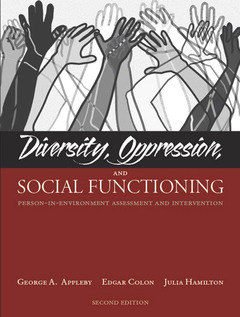Description
Diversity, oppression, and social functioning, person-in-environment assessment and intervention (2nd ed )
Authors: COLON Edgar, APPLEBY George, HAMILTON Julia
Language: English
Approximative price 78.38 €
Subject to availability at the publisher.
Add to cart416 p. · Paperback
Description
/li>Contents
/li>
Using the 'Person-In-Environment' (PIE) theoretical framework, this diversity practice text teaches students how to think about their personal reactions and assumptions about diversity and what constitutes cultural competent 'assessment' and 'intervention' when working with a broad range of diverse populations.
The diverse populations presented in the text are described within an ecological, strengths perspective. The authors' thesis is that, in order to work effectively with diverse populations, it is necessary to take into consideration the complex dynamics of social functioning and social oppression. The 'Person-In-Environment' theoretical framework provides a basis for analysis of the social, economic, and political reality of these diverse populations. The text presents an affirmative practice approach and builds on the available diversity practice literature.
This text can be used in diversity practice courses, courses on working with oppressed populations, and other practice courses (such as advanced practice) that focus on diversity issues.
Forward.
Preface.
1. Framework for Practice with Diverse and Oppressed Clients.
2. Culture, Social Class, and Social Identity Development.
3. Ethnic Identity Development.
4. Dynamics of Oppression and Discrimination.
5. Racism: African-American and Caribbean Islanders.
6. Women and Sexist Oppression.
7. A Multi-Diversity Perspective on Latinos: Issues of Oppression and Social Functioning.
8. Native Americans: Oppression and Social Work Practice.
9. Asian Americans: Ethnocentrism and Discrimination.
10. Lesbian, Gay, Bisexual, and Transgender People Confront Heterosexism, Heterocentrism, and Homophobia.
11. Ableism: Social Work Practice with Individuals with Physical Disabilities.
12. Religious Bigotry and Religious Minorities.
13. Ableism: Mentally and Emotionally Challenged People.
14. Social Work Practice with Immigrants.
15. Appearance Discrimination.
16. Affirmative Practice with People Who Are Culturally Diverse and Oppressed.
Appendix A.
Index.
List of Figures.




